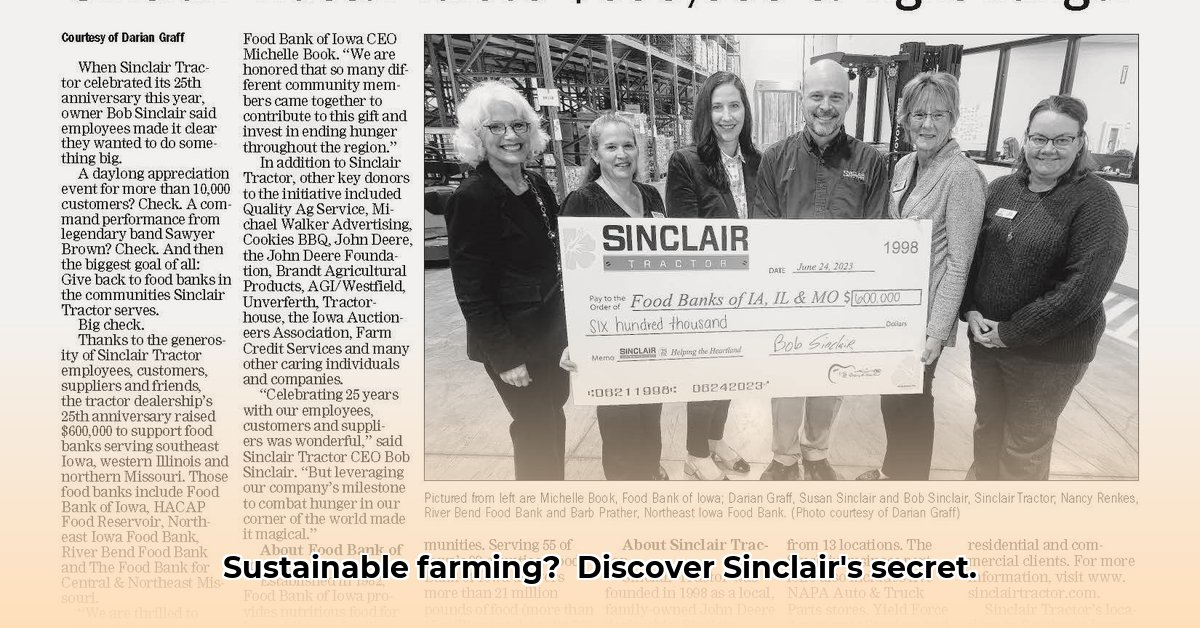
Company Overview: A Deep-Rooted History in Iowa Agriculture
Sinclair Tractor, established in Houghton, Iowa, in 1998, has steadily grown into a prominent agricultural equipment dealer serving Iowa, Illinois, and Missouri. More than just a supplier of tractors and machinery, Sinclair has cultivated a reputation built on strong customer relationships and a diversified client base, extending beyond traditional farmers to include landscapers and contractors. This diversified approach provides resilience against economic downturns affecting any single sector. While precise sales figures remain unavailable, Sinclair's market presence and regional influence point to significant growth and sustained profitability within the competitive agricultural equipment landscape. This case study will analyze Sinclair's success factors, challenges, and future prospects within the context of sustainable agriculture. For more on Iowa agriculture, see this Iowa PBS documentary.
Success Factors: Building Relationships and Diversifying Offerings
Sinclair Tractor's success stems from a multi-faceted approach:
Strong Customer Relationships: Sinclair prioritizes building long-term relationships with its clients, understanding their individual needs and providing tailored solutions beyond simple equipment sales. This loyalty-focused strategy fosters repeat business and positive word-of-mouth referrals. This personalized approach is essential in building trust, a valuable asset in the agricultural community.
Diversified Customer Base: By serving landscapers and contractors in addition to farmers, Sinclair mitigates risk associated with economic fluctuations impacting any single agricultural sector. This diversification strengthens overall business stability and makes Sinclair less vulnerable to sector-specific downturns.
Reliable Service and Product Quality: Sinclair's commitment to providing high-quality equipment and dependable service ensures farmer productivity and reduces downtime, crucial factors in successful agricultural operations. This emphasizes the value proposition beyond simply sales.
Challenges and Risks: Navigating Uncertainty in the Agricultural Sector
While Sinclair has demonstrated remarkable resilience, several challenges threaten its continued success. The Risk Assessment Matrix below highlights these key risks and potential mitigation strategies:
| Risk Factor | Likelihood | Impact | Potential Mitigation Strategies |
|---|---|---|---|
| Economic Downturn | Moderate | High | Diversify customer base further; offer flexible financing options; build up financial reserves; explore strategic partnerships. |
| Changing Farming Practices | High | Moderate | Invest in training programs for farmers on new technologies and techniques; offer a wider range of equipment; provide consultations on best practices. |
| Climate Change | High | High | Partner with organizations promoting sustainable practices; offer climate-resilient equipment; educate clients on water conservation and efficient farming methods. |
| Supply Chain Disruptions | Moderate | Moderate | Develop relationships with multiple suppliers; explore alternative sourcing options; implement robust inventory management systems. |
| Increased Competition | Moderate | Moderate | Invest in marketing and customer service excellence; explore niche markets; develop unique service offerings. |
How can Sinclair effectively balance profitability with the growing demand for sustainable agricultural practices? This is a critical question.
Sustainability Initiatives: Opportunities for Growth
While Sinclair's current sustainability initiatives aren't explicitly detailed, the company's success depends on adapting to the growing demand for environmentally conscious farming practices. Sinclair could significantly enhance its sustainability profile by:
Promoting Energy-Efficient Equipment: Offering and actively promoting equipment with lower fuel consumption and reduced emissions would strongly appeal to environmentally conscious farmers.
Partnering with Sustainable Organizations: Collaboration with organizations focused on sustainable agriculture could provide access to valuable resources, expertise, and networking opportunities.
Investing in Precision Agriculture Technology: Promoting and providing support for precision farming technologies would directly contribute to more efficient resource use, reducing waste and environmental impact.
Future Outlook: Strategies for Continued Success
Sinclair's future prospects depend on proactive, strategic adaptation. Several key actions can enhance its position in the market:
Enhanced Online Presence: Improve their online presence to reach a wider audience and showcase their expertise in agricultural equipment and sustainable practices.
Data-Driven Decision Making: Leverage data analytics to better understand customer needs and anticipate market trends.
Strategic Partnerships: Seek partnerships with equipment manufacturers, agricultural organizations, and technology providers to expand product offerings and services.
Embrace Technological Advancements: Invest in training and support for precision farming technologies to cater to the evolving needs of environmentally conscious farmers.
Expand Consulting Services: Offer data-driven consulting services to farmers, helping them optimize their operations and implement sustainable practices. This adds significant value beyond simple equipment sales.
Conclusion: A Foundation for Continued Growth
Sinclair Tractor’s success is a testament to strong customer relationships, product diversity, and a commitment to providing reliable service. While various challenges lie ahead, particularly those related to climate change and economic variability, Sinclair appears well positioned for continued growth by focusing on sustainable practices, embracing technological advancements, and cultivating key partnerships. Its ability to adapt and proactively anticipate the evolving needs of the agricultural sector will ultimately determine its long-term success.